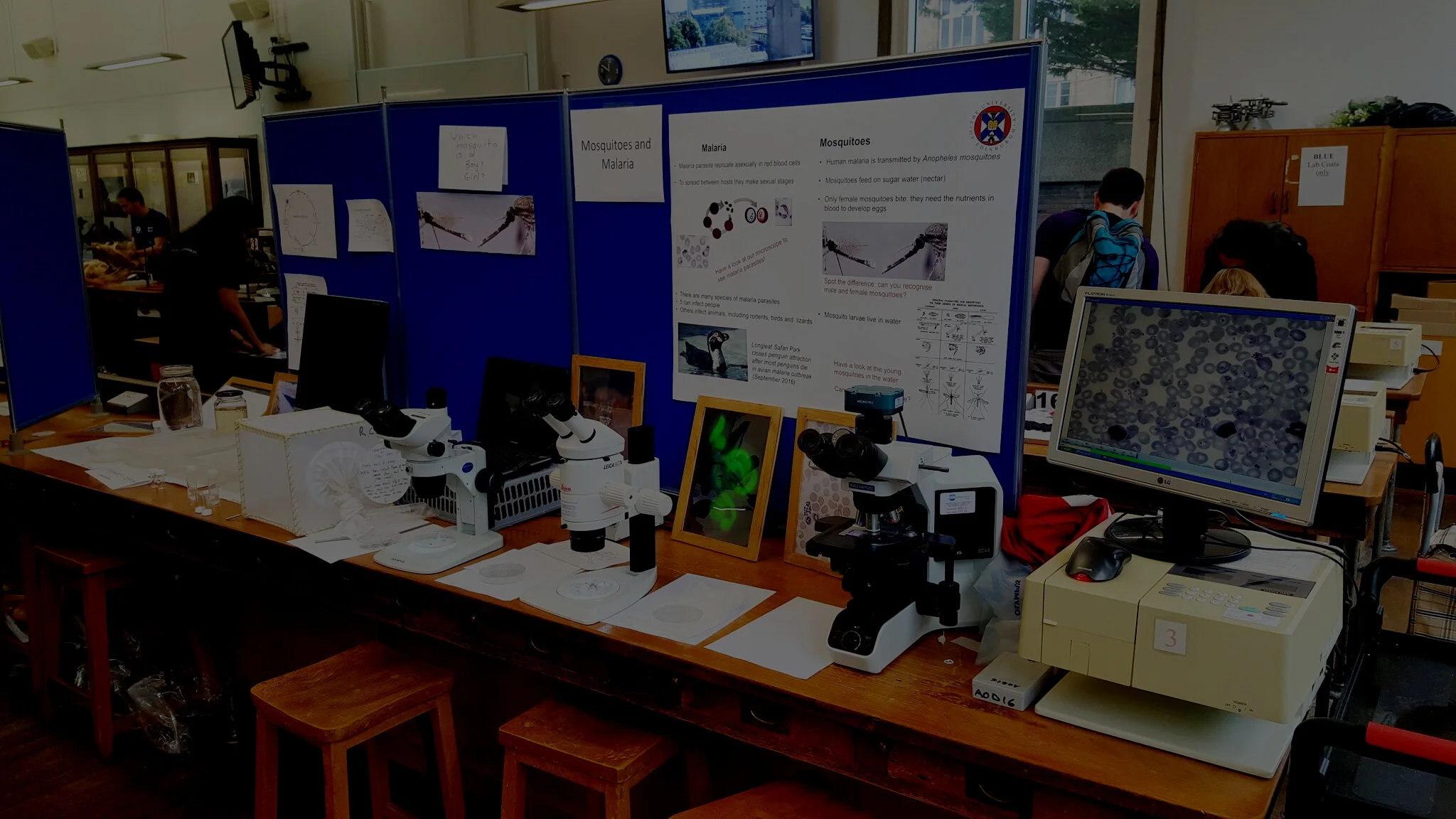It's important to us that we engage the public with our research. Presenting our work to the public has taught us to communicate more effectively and has aided us in developing new research questions. We've given public talks, magazine articles, press releases, our lab has been active in visiting schools and museums, and participating in doors open day. We have designed various activities based around our research questions that are suitable for all ages.
We are particularly interested in providing oppportunities for public/pupils that may not normally have the resources or contacts to engage with scientists.
If your school/museum is interested in our lab visiting please get in touch via our Contact Page
School Visits
We've visited several schools to talk about the work we do as a lab and to also promote STEM as future career path.
We have activities catered for Primary and Secondary school students that include:
- Observing mosquito life cycles including life aquatic stages
- Sorting adult mosquitoes by morphology
- PCR 'games' and disease diagnostics
- Talks on how mosquitoes carry disease and how the malaria parasites we study keep in time with their host
We've had great feedback from both teachers and students, with them finding it fun, informative and taught at an appropriate level.
Polkemmet Primary visit:
One of our more recent school visits, our aim was to demonstrate to the children that Biology and Science were achieveable career paths. This visit was particularly fun for us as the children came up with some ‘outside the box’ ideas for experiments and they loved having first hand experience sorting mosquitoes
“The kids loved it. They were engaged from start to finish so I would not change the activities. The stress on job opportunities is really relevant right now. ”
North Berwick High School, S2 Class:
Following the school’s international theme, one S2 science class studied the reactions of mosquitoes from South America, hatched at Edinburgh University, along with looking at a variety of tropical diseases.
“As well as our test on the mosquitoes we also played a game where we had to match up three pictures to some animal spread diseases. It was interesting to find out about the diseases... the class had a really good lesson!
”
“The visit to the University was of greater use than the run of the mill open days and the pupils were highly motivated by the experience.”
North Berwick High School, S6 Class:
Dr. Petra Schneider a scientist from Edinburgh University kindly offered her time for S6 North Berwick pupils currently studying Advanced Higher Biology to perform an experiment which clarified difficult work in our course, this being DNA extraction and amplification (PCR). We managed to do half of the experiment within our biology lab at school and Petra completed them for us within her lab at Edinburgh University. Pupils then visited the lab to see the results of their experiment and to talk to real scientists for the day.
“ We thoroughly enjoyed our day and found it to be a great insight into where our studies at the moment could lead us. Once again thank you to all at the university.”
Liberton Primary, Class P3b:
Primary school visits are always a lot of fun and Liberton Primary was no exception. Kids learned to diagnose disease using our ‘PCR game’.
“Science fun in P3b last week - mosquito madness! We saw live mosquitos at adult and larval stages, identified different stages in the life cycle, examined them under a microscope and used pipettes to fill chambers in a tray to find the secret code. We even got to wear lab coats!”
West Linton Primary, Scottish Borders, P1 and P2 Classes:
As part of the school’s “health” project, pupils experienced being a scientist. They used microscopes to identify healthy and unhealthy blood, infected with malaria parasites, and tricked live mosquitoes into performing different behaviours.
““A fantastic learning opportunity” ”
Museum Trips
Museum trips have been really enjoyable for us and the visitors to our stand. With over 300 visitors, children and adults visiting the Great North Museum in Newcastle learned about the mosquito life cycle and how mosquitoes are responsible for transmission of many diseases.
This was a great oppportunity for us as it enabled us to meet members of the public that wouldn't normally visit the lab or be included in school trips.
We would love to do more visits like this so if you have more museum opportunities please get in touch.
Doors Open Day
Each year we participate in Edinburgh Doors Open Day at the University of Edinburgh which allows the public to visit the University and learn about the various research that happens around campus.
The live mosquitoes are always popular as are the water based larval stages which often surprise people! We also give people an opportunity to see genuine malaria samples under the microscope. We emphasize how the morphological differences in parasite cell stages can help us understand how the parasites keeps in synchrony with the host
Seeing real parasites often fuels conversation about the disease and how it's still very much a problem world-wide.

